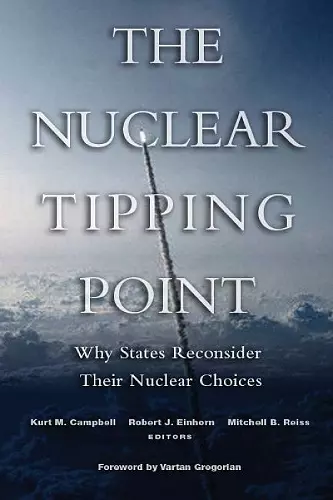The Nuclear Tipping Point
Why States Reconsider Their Nuclear Choices
Kurt M Campbell editor Mitchell B Reiss editor Robert J Einhorn editor
Format:Hardback
Publisher:Bloomsbury Publishing PLC
Published:23rd Jun '04
Currently unavailable, our supplier has not provided us a restock date

"
More than half a century after the advent of the nuclear age, is the world approaching a tipping point that will unleash an epidemic of nuclear proliferation? Today many of the building blocks of a nuclear arsenal—scientific and engineering expertise, precision machine tools, software, design information—are more readily available than ever before. The nuclear pretensions of so-called rogue states and terrorist organizations are much discussed. But how firm is the resolve of those countries that historically have chosen to forswear nuclear weapons? A combination of changes in the international environment could set off a domino effect, with countries scrambling to develop nuclear weapons so as not to be left behind—or to develop nuclear ""hedge"" capacities that would allow them to build nuclear arsenals relatively quickly, if necessary. Th e Nuclear Tipping Point examines the factors, both domestic and transnational, that shape nuclear policy. The authors, distinguished scholars and foreign policy practitioners with extensive government experience, develop a framework for understanding why certain countries may originally have decided to renounce nuclear weapons—and pinpoint some more recent country-specific factors that could give them cause to reconsider. Case studies of eight long-term stalwarts of the nonproliferation regime—Egypt, Germany, Japan, Saudi Arabia, South Korea, Syria, Turkey, and Taiwan—flesh out this framework and show how even these countries might be pushed over the edge of a nuclear tipping point. The authors offer prescriptions that would both prevent such countries from reconsidering their nuclear option and avert proliferation by others. The stakes are enormous and success is far from assured. To keep the tipping point beyond reach, the authors argue, the international community will have to act with unity, imagination, and strength, and Washington's leadership will be essential. Contributors include Leon Feurth, George Washington University; Ellen Laipson, Stimson Center; Thomas W. Lippman, Middle East Institute; Jenifer Mackby, Center for Strategic and International Studies; Derek J. Mitchell, Center for Strategic and International Studies; Jonathan D. Pollack, U.S. Naval War College; Walter B. Slocombe, Caplin and Drysdale; and Tsuyoshi Sunohara, Center for Strategic and International Studies.
""THE NUCLEAR TIPPING POINT: WHY STATES RECONSIDER THEIR NUCLEAR CHOICES, should be required reading... it focuses on a new breed of potential proliferators and does a real service by assessing what factors have helped keep most countries from going nuclear--and what factors might tip the balance in the other direction." —Jon B. Wolfsthal, Foreign Affairs, 1/1/2005
|"Strong U.S. leadership, the editors say, is needed to harness partners and institutions and to keep countries away from the nuclear tipping point where proliferation becomes inevitable and uncontrollable. They assert we are not near the tipping point now, nor are we necessarily destined to reach it, but they note that, once the tipping process becomes identifiable in the NPT regime, it may be very difficult to stop." —Thomas Graham Jr., former Special Representative of the President for Arms Control, Arms Control Today, 11/24/2004
ISBN: 9780815713302
Dimensions: 235mm x 159mm x 31mm
Weight: 703g
367 pages